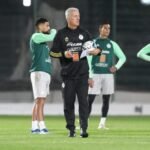Dutch-born Ghanaian wing-back Jeremie Frimpong has opened up about his decision to represent the Netherlands instead of Ghana, highlighting the lack of early interest from the Ghanaian Football Association as a crucial factor.
In a candid podcast interview with PapaGhana on “Kick ‘t met,” Frimpong discussed his choice, explaining, “For me, it was not even like they (Ghana) were coming when I was younger, it’s now that I’ve grown that they are coming, but back then they were never there.”
When asked about the importance of early engagement for young players, Frimpong emphasized, “Yes, that’s a big factor, 100%.
For instance, Holland, when you are young, they come directly to you and reveal their plans to you.”
Frimpong, currently part of the Dutch national team for Euro 2024, underscored how proactive engagement by the Netherlands played a pivotal role in his decision.
The Dutch football system’s commitment to identifying and nurturing talent from a young age contrasts sharply with his experience with Ghana, where the approach was notably delayed.
Frimpong’s reflections bring to light the critical impact of early scouting and communication by national football associations in shaping a player’s international career.
His case serves as a reminder that timely and strategic outreach can significantly influence the choices of dual-nationality players, who often have the option to represent more than one country.
The 22-year-old Bayer Leverkusen defender has been a standout performer in the Bundesliga, earning him a call-up to the Dutch squad.
His journey reflects the Netherlands’ robust system of talent development and their ability to integrate young players into the national setup seamlessly.
Frimpong’s comments resonate with the broader discourse on national team selections, especially for countries with a significant diaspora.
The Ghanaian FA’s delayed approach contrasts with the proactive stance of European football associations, which often secure commitments from young talents much earlier.
As Frimpong prepares to compete at Euro 2024, his story serves as a lesson for football associations worldwide about the importance of early and consistent engagement with young players.
His choice is a testament to the power of foresight and strategic planning in national team development.
In the competitive world of international football, where the best talents have multiple options, Frimpong’s narrative underscores the necessity for national associations to be proactive and present in the lives of potential stars from an early age.












